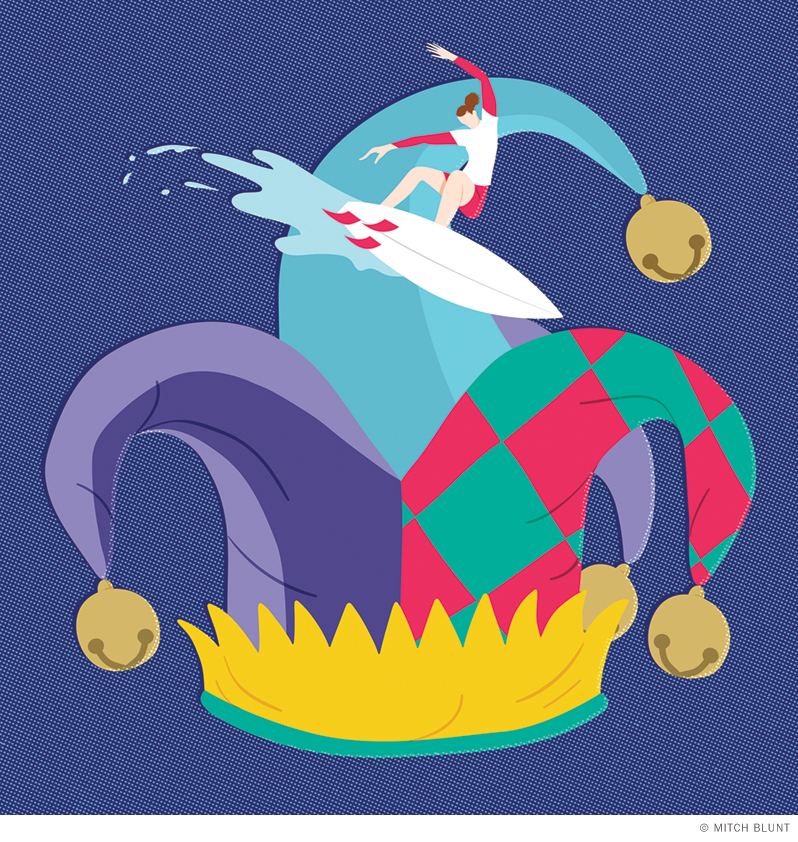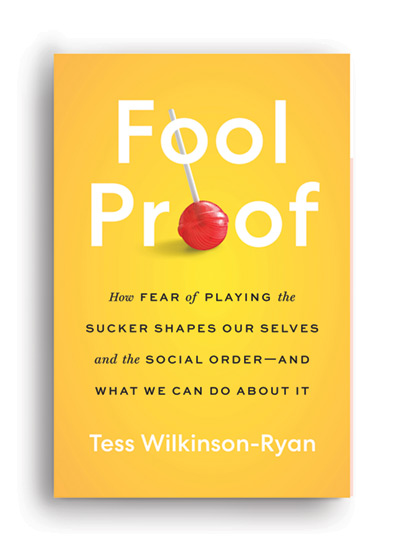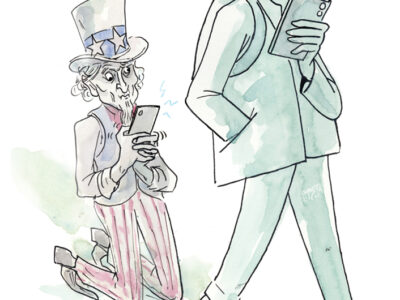
The upside of being a sucker.
By Tess Wilkinson-Ryan
The first year of the pandemic, my fourth-grader and I did a lot of walking around Philadelphia. I would insist that we get out each day, cajoling her with pleas for “fresh air” or “stretching our legs.” To engage her on one of these walks, I told her she could be a subject in some of the studies I was reading for my research project, a book on suckers. I had been rereading economics and psychology studies from the last half-century to chart how the fear of playing the fool can distort human decision-making. I started my daughter off with a classic: a behavioral economics dilemma called the Ultimatum Game. It’s a simple game with two players; one has $10 and has to offer a portion to the other, who has none. The offeree can then accept (game over, money shared as proposed) or reject (game over, both players get nothing).
You can probably imagine how this plays out in real life; most players who get offered less than three or four dollars pick the lose–lose outcome, preferring to get nothing rather than the short end of the stick. I narrated it to my daughter with maximum dramatic effect. “You’re paired up. Your partner has $10 to share. You look at the message to see what you got, and you can’t believe it—they’re only giving you ONE DOLLAR!? What do you do??” I tried to sound anguished.
She was nonchalant. “Well, a dollar is better than no dollars. Keep the dollar,” she responded easily. I protested: What about fairness? What about honor?! Revenge!!!
“What? Mom? No.” She regarded me curiously. “What do you care if they get more than you?”
It’s a pretty good question! What do I care indeed?
When she was much younger, still in nursery school, we used to joke that she was our little utilitarian. And she really wanted to know what it would get me, how it would make my life better, to decline that dollar. What do I care if I’m playing the fool? What are the stakes? How do I account for the pain of feeling duped, or the comforts of self-protection?
The answers to these questions are important, because they excavate truths about our moral selves. Who do I want to be? What are my obligations, and to whom? How we figure out what our goals are—and how the fear of being a sucker gets in the way—is at the heart of moral reasoning.
When I talk to people about the fear of being a sucker, they often want to talk about rationality. Isn’t it rational to avoid getting duped? Am I saying that the fear is irrational? As an academic I am professionally obligated to respond, “Well, it depends,” and unfortunately in this case I mean it. A fear is more or less rational depending on what you’re trying to do. To think clearly through sucker problems, you have to be explicit about your goals.
If I am a player in the Ultimatum Game, I can’t evaluate my own strategy without knowing what I want out of the game. What values am I trying to vindicate with my choice? Game theory starts with the idea that most people are rational actors—self-interested maximizers driven to optimize their own welfare. This often means they are trying to get as much money as possible. But the idea of rationality, even in economics, is more capacious. It just refers loosely to the idea of having goals and choosing behaviors in line with those goals. The goals can be whatever goals you want; maybe you don’t want to make money, you want to distribute money evenly. Or maybe making money is less important to you than making friends, or making whatever social sphere you happen to find yourself in as copacetic as you’d like it to be.
The fear of playing the sucker can make it harder to read your own moral compass, muddying the picture to make it seem like cooperating with others is a weakness. In example after example in the book that eventually became Fool Proof, from welfare benefits to political violence to simple lab games, I puzzled over situations in which people seemed to be working against their own interests. For many people, the nagging feeling that a situation could be a scam turns out to be a constraint on personal and moral agency.
Experimentally, there is evidence that when some people are willing to risk weakness, their example can set a norm that helps the group commit to cooperation and achieve its goals. Two behavioral decision researchers wanted to see what happens when some players consistently behave cooperatively, even if others are selfish. They called their paper “Suckers or Saviors?”
They asked players to participate in a standard cooperative exchange task called the Public Goods game; each of four players would get money and the chance to contribute it to a communal pot. The amount in the pot would be multiplied and evenly redistributed—such that cooperation would amplify profits, but the maximum possible gain would go to a selfish player who took advantage of the generosity of three others. The players would participate in not just one round of the game, but 20. Other studies that had used multiple rounds of this game had routinely found that playing the game repeatedly tended to result in less cooperation with each iteration—when players saw that others were free-riding rather than cooperating, they too opted out over time. The researchers grouped the players into groups of four and then assigned every foursome a plant—one “confederate” (a player who was in on the experiment) who would contribute to the group pot no matter what.
For people trying to figure out whether to go for the cooperative choices—a choice they may find appealing, but risky on the sucker front—the idea was that a dogged, reliable contributor could make the risk feel less acute. It’s not so bad to mistakenly cooperate when someone else is playing that same strategy; at least you’re not alone out on that limb. This proved true; including one consistently cheerful sucker affected the choices of everyone else in the study. People who played with a frequent contributor were more likely to contribute themselves, and games that included the consistent contributor did not devolve the way that multi-round Public Goods Games normally would. The sucker was the savior.
That malleability—sucker or savior, depending on the frame—is key to thinking seriously about fools’ games in the real world. Am I a chump if I let another driver merge in front of me at the very last second? Am I a sap if I give money to a person panhandling on the street? What about if I take a gamble on a dicey investment and it goes sideways? Situations that look like scams in one light can look like reasonable risks in another; the 20th-century sociologist Erving Goffman famously referred to that kind of self-soothing perspective shift as “cooling out.” Maybe I’m the dupe, sure, but maybe I’m a laid-back road-tripper, a compassionate donor, or an investor with a high risk tolerance—and maybe the uncertainty can offer a little breathing room.
These mundane dilemmas pop up all the time, and as a self-proclaimed expert on fools I attract a lot of stories about life’s little scams. My younger sister, who has been listening to me talk about suckers for at least 15 years, called one afternoon with a pleasingly literal story of cooling out. She lives in Vermont, and she had taken a long bike ride with her husband and some friends. The ride turned out to be more than she had expected—she was in excellent shape for an oncologist but the other riders were in excellent shape for triathletes. They coasted into a small town with a general store and stopped to buy snacks. She was really thirsty and starting to feel lightheaded.
“So we came to the store and it’s not a regular convenience store, it turns out to be precious-Vermont, like they had house-made kombucha,” she told me. “And I am just trying to get a regular Gatorade and they were charging like $6 for it.”
She was indignant. Sure, tourists might come to Vermont and pay $6 for Gatorade. New Yorkers might pay $6 for Gatorade, and then get one of those white oval VT car stickers. She, on the other hand, knows better! (As her older sister, I am obligated to point out that she herself is not from there either. She and I are squarely in the target demographic for Vermont-cute. We love kombucha.)
“Anyway,” she continued, “A Gatorade was literally worth $100 to me at that moment. I thought of you and was like, what am I doing?” Thus cooled, she bought the drink and rode home.

Tess Wilkinson-Ryan L’05 G’06 Gr’08 is a professor of law and psychology at the Penn Carey Law School, and the author of Fool Proof: How Fear of Playing the Sucker Shapes Our Selves and the Social Order—and What We Can Do About It. From the book Fool Proof Copyright ©2023 by Tess Wilkinson-Ryan. Published by Harper Wave, an imprint of HarperCollins Publishers. Reprinted by permission.





This is an excellent article; relatable and scientific at the same time. The “free-riding” phenomenon is rather a subset of the collective action problem: it is striking that having a ‘guaranteed sucker’ will lower the chances of falling into the collective action problem trap. One is always hesitant if their risk of being left behind is in solitude; the ‘guaranteed sucker’ ensures that if one is taken advantage of, they have somebody to give them company in their strife. Extremely well written!